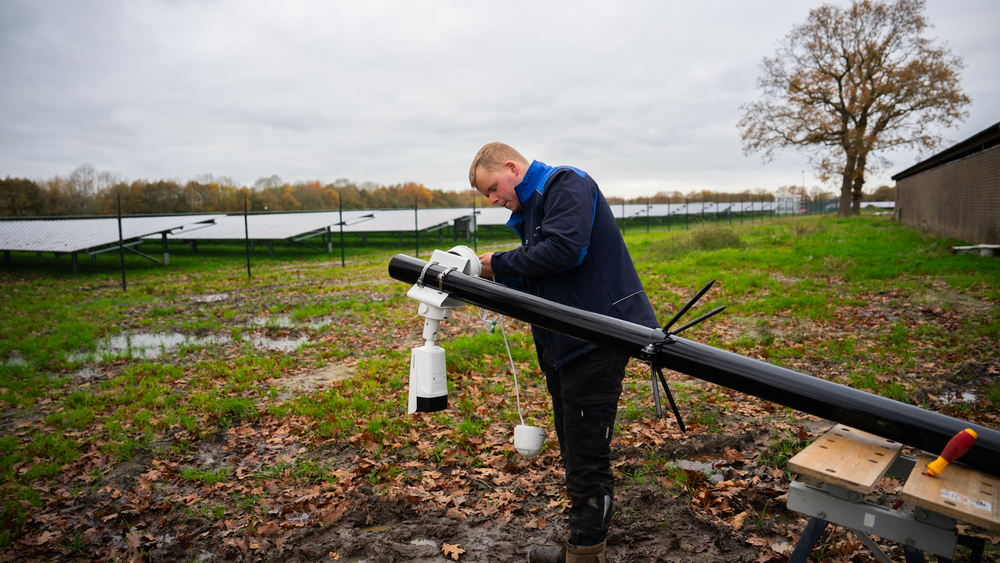

False alarms on solar farms are a big problem. Solar parks today require a sophisticated security system to prevent theft. Not only do conspicuous cameras deter copper thieves, but a well-functioning camera system is also a requirement of insurers. With cameras around the entire premises, suspicious activity is recorded day and night. But did you know that a very large proportion of reports from a camera system are false?
Every camera system reacts to a false report from time to time. This also happens regularly at solar parks. These false alarms occur due to various factors, such as moving branches, hard rain or animals walking or flying by.
Security cameras are designed to notice suspicious movements and trigger an alarm in case of a possible threat. Yet an innocent situation, such as a bird flying in front of the camera, can trigger an alert. This notification then reaches the monitoring station without anything actually happening.
How many false alarms a solar farm gets depends on the size of the farm and the number of cameras. A large park with tens of thousands of solar panels and more than 40 cameras sometimes gets more than 10 false alarms a day.
If a security system detects a suspicious situation, it is forwarded to a control room. This control room checks the images and assesses whether there is actually a threat. For example, do they see someone on the images cutting a copper cable? If so, a security team or the police will immediately go and check the scene.
However, if it is a false report and nothing suspicious can be seen on the images, it is recorded and logged without further action. It may also happen that a control room sends security guards to the location if they do not trust it.
A large solar farm faces false alarms every day. This can cause a lot of frustration for control rooms. An abundance of reports makes it difficult for a control room to check every report immediately. Because there is often a limit to the number of reports that can be processed, there is a risk that real threats will be spotted too late.
But this is not the only thing. False reports on solar parks also cause high costs. Each report costs money, and as a solar park owner or manager, you often pay a fixed amount per report. Among other things, you pay for checking the images, but also for deploying security guards. The more reports, the higher the costs. On an annual basis, 10 false reports per day can cost a lot of money.

Many solar park owners and operators will recognise the problem of false alarms. Especially when it comes to a park more than 100 football fields in size with dozens of cameras working day and night, false alarms are inevitable. Did you know that the largest solar park is currently being built in Groningen? This solar park will be as big as 320 football fields! [1] False reports on solar farms will always exist, but thanks to our AI server, the control room has to check a lot less of them.
In fact, our AI server filters images before sending them to the monitoring centre. Through smart analysis, the server distinguishes innocent movements from serious threats. For example, it can recognise faces and analyse movements.
Where normally 10 false alarms end up directly at the control room, only three or four of them remain thanks to our technology. This results in substantial cost savings because you only pay for alerts that are actually forwarded. And you can be sure that alerts are always checked.
Are you a solar farm manager, owner or asset manager and want to get rid of the frustrations around false reports? Or are you curious about how your existing solar farm security can be even smarter? Feel free to contact us and find out how our smart technology can secure your solar farm more effectively and cost-efficiently.
False alarms are caused by moving branches or leaves, heavy rain, birds, rabbits or other animals, technical failures and changes in light, among other things.
This depends on the size of the solar farm and the number of cameras. A large park may get more than 10 false alarms per day.
As a solar farm owner or operator, you often pay a fixed amount per report. Many false alarms therefore cause high costs due to the extra work for control rooms and security guards. Moreover, false alarms mean that real threats are less likely to be spotted because control rooms cannot check an unlimited number of reports.
Sources:
NOS, 11 February 2025
Call us 085 744 1944
Or report it here: Failure form